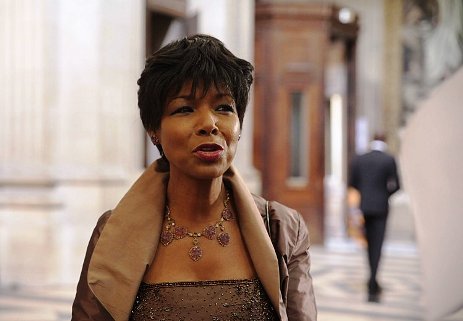
 Euzhan Palcy is a film director, writer and producer from Martinique. She is notable for being the first black woman director produced by a major Hollywood studio (MGM), for A Dry White Season, as well as the only woman filmmaker to have directed Marlon Brando, whom she brought back to the screen after a gap of nine years. Palcy is also the first black artist to win a César Award, the highest French film award.
Euzhan Palcy is a film director, writer and producer from Martinique. She is notable for being the first black woman director produced by a major Hollywood studio (MGM), for A Dry White Season, as well as the only woman filmmaker to have directed Marlon Brando, whom she brought back to the screen after a gap of nine years. Palcy is also the first black artist to win a César Award, the highest French film award.
Palcy grew up studying the films of Fritz Lang, Alfred Hitchcock, Billy Wilder and Orson Welles. She left Martinique for Paris in 1975 to earn a master’s degree in French Literature, in theater at the Sorbonne, a D.E.A. in Art and Archeology and a film degree (specializing in cinematography) from renowned Louis Lumière College.
It was in Paris, with the encouragement of François Truffaut that she directed her first feature, Sugar Cane Alley (1983). The film documents the love and sacrifice of a poor black family living on a Martinique sugar cane plantation in the 1930s. Sugar Cane Alley won over 17 international awards including the prestigious César Award (the French equivalent to Academy Award) for best first feature film.
Marlon Brando was so moved by her next project, A Dry White Season (1989), and her commitment to social change that he came out of a self-imposed retirement, agreeing to act in the film for free. Also starring in the film were actors Donald Sutherland and Susan Sarandon. Palcy adapted A Dry White Season from the novel by South African writer, André Brink. The story focuses on the social movements of South Africa and the Soweto riots, and was heralded for putting the politics of apartheid into meaningful human terms. To research the riots, she was introduced to the people of Soweto township by Dr Motlana, (Nelson Mandela’s and Desmond Tutu’s personal physician), while she eluded the South African secret services posing as a recording artist.
Palcy became the first black female director produced by a major Hollywood studio and is the only black filmmaker who succeeded in making a feature film against apartheid in the U.S. during the 27 years of Nelson Mandela’s incarceration. The film enraged the South African oppressive regime and was banned in South Africa for a time.
The late Senator Ted Kennedy supported the Filmmaker. Brando’s performance in the movie earned him his 8th and last Academy Award nomination for Best Supporting Actor and he received the Best Actor Award at the Tokyo Film Festival. For her outstanding cinematic achievement, Palcy received the “Orson Welles Award” in Los Angeles. For the first anniversary of his election Nelson Mandela welcomed Euzhan Palcy in South Africa and granted her an exclusive interview.
For Disney/ABC Studios, Palcy directed and produced Ruby Bridges (1998) the story of the little New Orleans girl who was the first to integrate the public schools, immortalized in the painting by Norman Rockwell.
For Paramount/Showtime Studios, she directed The Killing Yard (2001), starring Alan Alda and Morris Chestnut. The drama is based on the true events surrounding the 1971 Attica prison riot which had an indelible impact on the American prison system and jury process. The film won the Silver Gavel Awards from the American Bar Association.
Basic obstacles that Palcy has personally confronted over the years include racial typecasting as a filmmaker strictly of “Black films” and the refusal by producers and distributors to back or market projects focused on or by Black people for fear that the French viewing public would not pay good money to see stories focused on Black people, as she has been repeatedly told.
(more)
